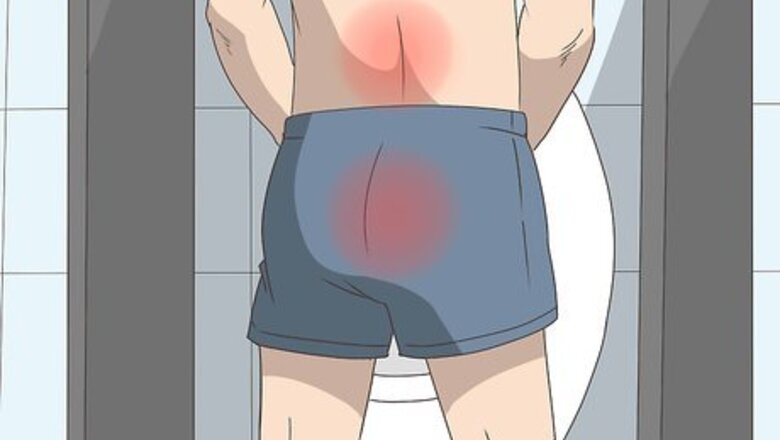
views
X
Research source
and if you’re a man over the age of 25, it’s getting larger. But, that’s totally normal and shouldn’t be painful at all.[2]
X
Trustworthy Source
National Institute of Diabetes and Digestive and Kidney Diseases
Health information from the National Institute of Diabetes and Digestive and Kidney Diseases, a division of the U.S. National Institutes of Health
Go to source
As you get older your prostate will continue to increase in size. Sometimes, your prostate can become infected and inflamed, which can cause painful symptoms. If you’re experiencing prostate pain, see your doctor to rule out more serious medical issues such as cancer.[3]
X
Research source
We’ve answered a few common questions about what causes prostate pain and what you can do about it to help you stay informed.
What does prostate pain feel like?
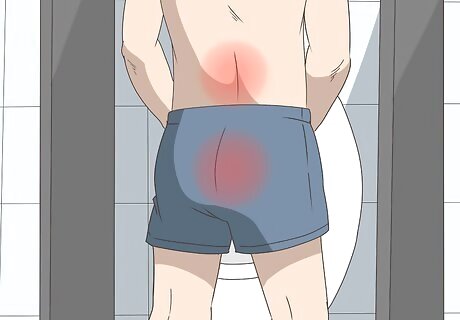
You can have pain in your abdomen, groin, and lower back. Prostate pain can radiate around different regions in your abdomen and groin. You can have pain at the base of your penis, in your testicles, and in the perineum, which is the area between your scrotum and rectum. You can also have pain in your lower back or the sensation of a full rectum. Symptoms can vary from person to person and can change locations. For instance, you can have pain in your lower back one day and then have painful testicles another day.
You can also have problems urinating or ejaculating. Problems with your prostate, such as prostatitis or prostate cancer, can cause you to feel pain or a burning sensation whenever you pee. You can also experience pain whenever you ejaculate.
What causes prostate pain?
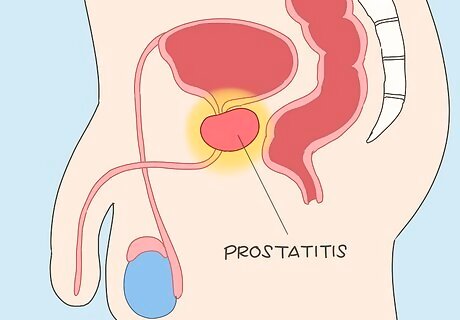
Prostatitis is the most common cause of prostate pain. Prostatitis is a common bacterial infection of your prostate. It can cause painful, red, swollen tissue as well as pain whenever you urinate or ejaculate. Prostatitis can also be caused by a direct injury that causes your prostate to become swollen and irritated.
Prostate cancer can also cause pain. Though less common than prostatitis, painful symptoms can be early warning signs of prostate cancer. Because your prostate gland is close to your bladder and urethra, it can cause a burning or painful sensation whenever you urinate. It can also cause pain whenever you ejaculate.
What medications help with prostate pain?
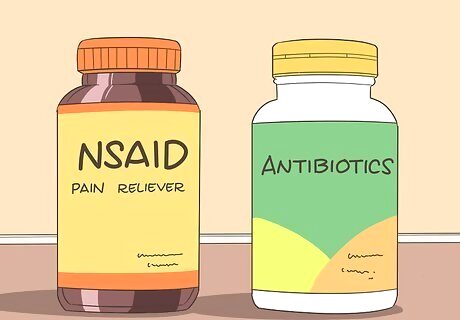
Nonsteroidal anti-inflammatory drugs (NSAIDs) can help with the pain. NSAIDs are over-the-counter pain relievers like ibuprofen (Advil) and naproxen (Aleve). You can also try aspirin, which can help relieve pain and inflammation. Pick up some pain meds from your local pharmacy and follow the directions on the packaging when you take them to help relieve your pain. Your doctor may also prescribe you stronger NSAIDs if they think it’ll help.
Antibiotics can clear up an infection and help get rid of the pain. If your prostatitis is caused by an infection, your doctor will prescribe you antibiotics. Take them as prescribed until they’re finished to knock out the infection, which can help reduce your pain and keep your symptoms from getting worse.
What can I do at home to feel more comfortable?
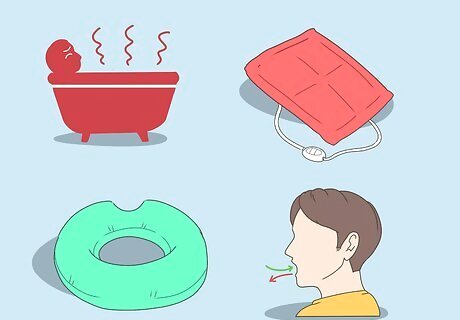
Hot baths or a heating pad can help ease your pain as well. Warmth and heat can help with painful inflammation. For your prostate, you can soak in a nice hot bath or sit on a hot water bottle or heating pad to see if that provides relief.
Use a donut pillow or an inflatable cushion if sitting is painful. For some men, sitting can be really uncomfortable if you have a swollen or inflamed prostate. If that’s the case for you, try using a soft donut pillow or a cushion to provide some relief whenever you need to sit for activities such as driving or while you’re at work.
Reduce your stress with relaxation techniques and regular exercise. Stress and anxiety have been shown to make prostate symptoms worse. Use deep breathing or meditation to help relax your mind and body. Additionally, try to exercise for at least 30 minutes 2-3 times a week to reduce your stress levels. It doesn’t have to be anything crazy. Even a nice 30-minute walk or jog can give you a whole host of health benefits and reduce your prostate pain.
What foods are good for your prostate?

Fruits and veggies are great for your prostate. Cruciferous veggies like broccoli, cabbage, and kale are loaded with antioxidants, vitamins, minerals, and special phytochemicals that can potentially help prevent cancer cell growth and help reduce inflammation. Tomatoes are rich in lycopene, a powerful antioxidant that’s great for your prostate. Berries such as blackberries, strawberries, blueberries, and raspberries are also chock full of antioxidants, which can boost your prostate health. Add berries to a meal or enjoy them as a light snack.
Add more cold-water fish to your diet for the healthy fats. Cold-water fish include fish like salmon, sardines, and trout. They’re rich in omega-3 fatty acids, which are healthy fats that can prevent inflammation. Enjoy a tasty serving of fish at least once a week to get enough of the fatty acids and give your prostate health a boost. Not all fish are created equal. Studies show that seafood such as canned tuna and other, non-cold-water fish, are more inflammatory than fish like salmon.
Drink green tea and hibiscus tea for the antioxidants. Both of these types of tea contain tons of antioxidants and are great for your prostate health. Studies suggest that chemicals in hibiscus leaves may actually help prevent prostate cancer. Similarly, other studies have found that the anti-cancer properties of green tea may help prevent prostate cancer as well. Make yourself a nice cup of tea as a tasty beverage you can enjoy that also gives your prostate health a boost.
What foods are bad for your prostate?
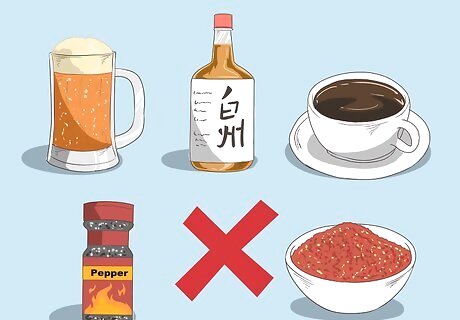
Limit alcohol, caffeine, and spicy or acidic foods. Caffeine, alcohol, and spicy or acidic foods can irritate your prostate and make your symptoms worse. Steer clear of alcoholic drinks or beverages with lots of caffeine such as coffee and black tea. Choose less acidic foods and avoid adding extra spice to your meals to help improve your prostate health.
How long does prostate pain last?
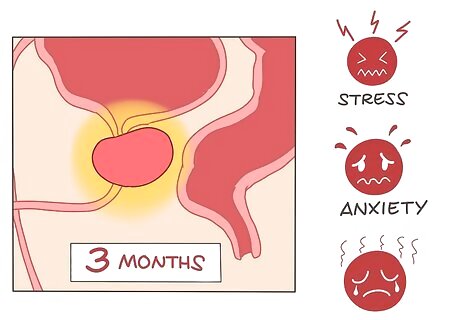
Chronic prostatitis can last for 3 months or longer. Prostatitis can cause a condition known as chronic pain pelvic syndrome (CPPS). It’s very common—19 out of every 20 men who have prostatitis have it. Prostatitis caused by a bacterial infection can be knocked out with a solid course of antibiotics, but painful symptoms can still persist for a time. Usually, symptoms can last for at least 3 months, but sometimes you can have painful flare-ups for years. Doctors aren’t really sure what causes CPPS, but flare-ups may be triggered by stress, anxiety, or depression. If you don't urinate as much or are unable to urinate for 24 hours, seek emergency care since there might be a blockage.




















Comments
0 comment